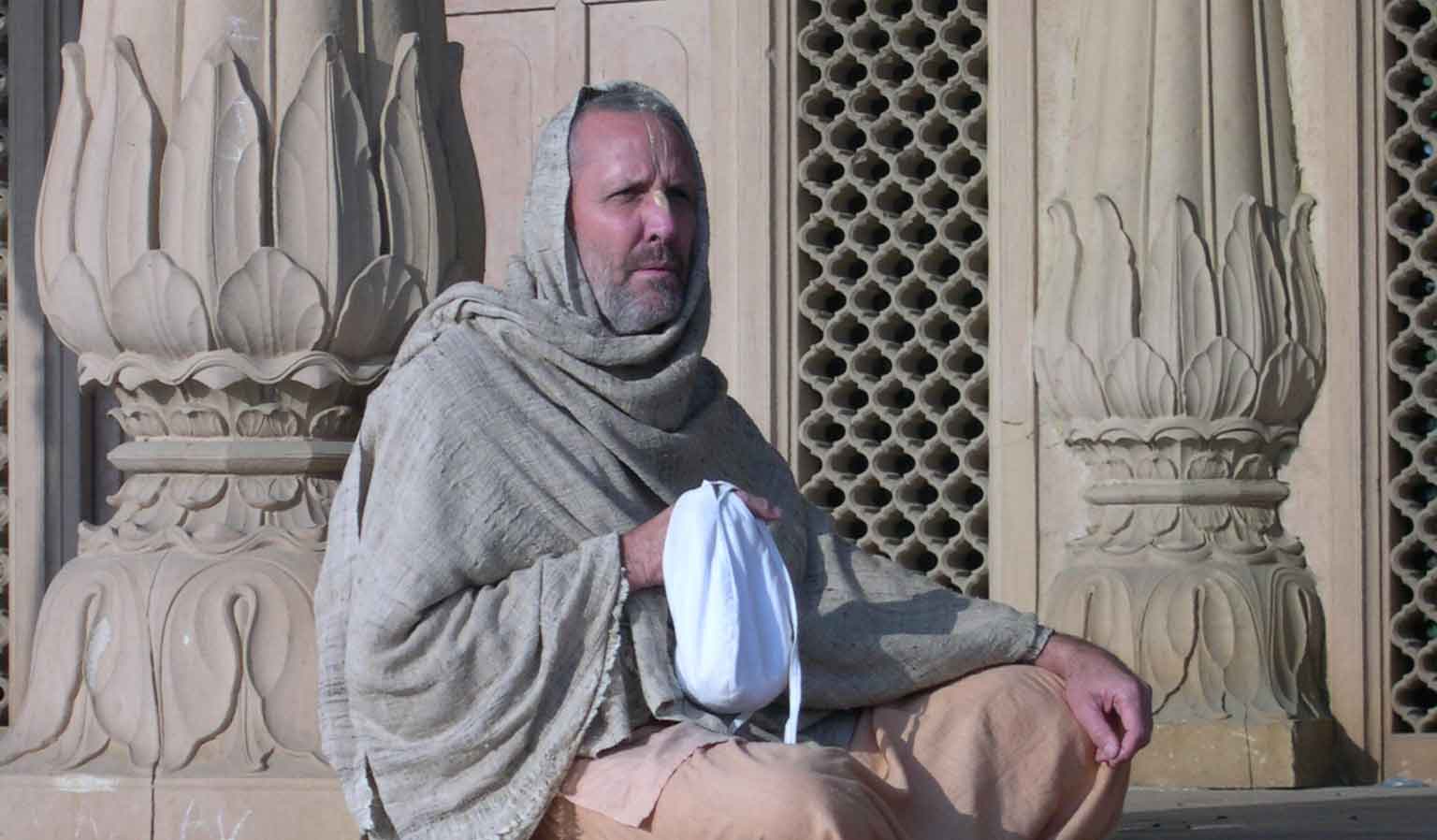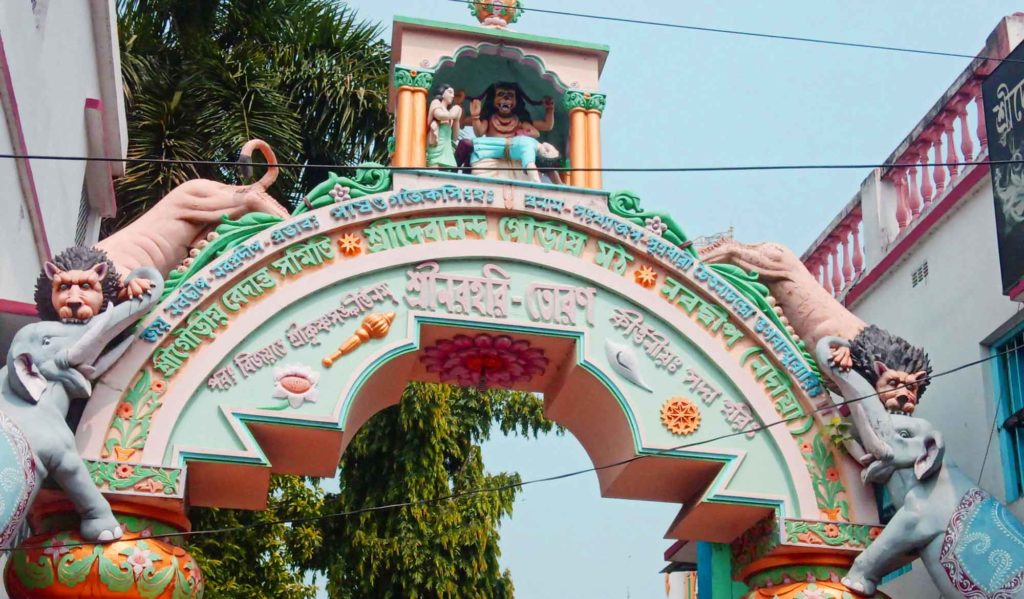Overview
This article, ‘After the Disappearance of Śrī Guru’ was adapted from a lecture by Śrīla Narasiṅgha Mahārāja on Śrīla Prabhupāda’s Disappearance Day on October 31st 2000, at Rādhā-Dāmodara Temple, Vṛndāvana. Mahārāja discusses the three types of devotee (kaniṣṭha, madhyama and uttama) in relation to the disappearance of Śrī Guru.
Question: What are the types of disciples who become manifest after the disappearance of the guru?
Answer: There are gradations and sub-gradations of all things, but basically the disciples of the guru manifest in three main categories: kaniṣṭha, madhyama, and uttama. The gradation in the development of śraddhā (faith) may be taken as the basic differentiating factor in these three types of disciples. The kaniṣṭha–adhikārī disciple has very little śraddhā – his faith in the instruction and spiritual teachings of the guru is very meagre and he has no faith in the Vaiṣṇavas.
mahā-prasāde govinde nāma-brahmaṇi vaiṣṇave
svalpa-puṇya-vatāṁ rājan viśvāso naiva jāyate
“For those who have amassed very few pious activities, their faith in mahā-prasāda, in Śrī Govinda, in the Holy Name and in the Vaiṣṇavas is never born.”
The kaniṣṭha-adhikārī disciple worships the physical form of his Gurudeva and may shout “Jaya Prabhupāda!” at the top of his lungs, but such glorification of the guru is lip deep only, because the kaniṣṭha-adhikārī disciple has no proper service attitude, faith, or surrender.
The kaniṣṭha-adhikārī disciple proclaims his Gurudeva to be the only bona fide guru. Having rejected the ontological position of Śrīla Rūpa Gosvāmī as the ācārya of the followers of Śrī Caitanya Mahāprabhu the kaniṣṭha-adhikārī disciple thinks, “Because my Gurudeva is the “Founder-ācārya,” the efficacy of the guru-paramparā is no longer applicable. All other branches and sub-branches of the guru-paramparā are all rendered useless.”
The kaniṣṭha-adhikārī disciple thinks that his Gurudeva is Absolute in all circumstances–he is unable to understand and properly harmonize the relative and Absolute statements of the guru.
The kaniṣṭha-adhikārī disciple has no subjective realization of his Gurudeva and he does not know anything of the ontological position of his Gurudeva in terms of guru-varga and aprākṛta–līlā. He is materially attached to the formal institution of his Gurudeva but he is lacking in siddhānta or philosophical understanding of the truths (tattvas) concerning the Absolute Truth. For all his endeavours the kaniṣṭha-adhikārī disciple simply becomes absorbed in society consciousness but not God consciousness.
The kaniṣṭha-adhikārī disciple lacks proper discrimination and he is thus offensive to pure Vaiṣṇavas. He considers his Gurudeva as non-different from the formal institution, non-different from his mūrti, and non-different from his books but he cannot recognize his guru on an internal plane. The kaniṣṭha-adhikārī disciple knows that, “Everything is in Prabhupāda’s books” but he does not know what that “thing” really is.
On certain holy days the kaniṣṭha-adhikārī disciple expresses his mundane sentiments of how his Gurudeva saved him from material life but the kaniṣṭha-adhikārī disciple cannot follow even the four regulative principles. Sometimes however the kaniṣṭha-adhikārī disciple does rigidly follow the four regulative principles but he does not follow the internal principles of pure devotional service, nor does he have any capacity to recognize the flow of divinity.
The kaniṣṭha-adhikārī disciple measures everything from the external or relative point of view. The kaniṣṭha-adhikārī disciple prides himself in external achievements of acquiring land, constructing buildings, amassing money and gathering many followers, but he has no concern for or understanding of inner spiritual life. The kaniṣṭha-adhikārī devotee is a bahirāṅga-bhakta, an external devotee.
The kaniṣṭha-adhikārī disciple sometimes thinks that he has become a rasika-bhakta and tries to relish the mellow of the higher līlās of the Supreme Lord. But due to his lack of genuine qualifications, the kaniṣṭha-adhikārī disciple displeases his spiritual master and creates a disturbance in the eternal līlās of the Lord.
Due to management propensities, expertise in business, or often by default (time spent in the mission) the kaniṣṭha-adhikārī disciple rises to a position of prominence and authority within the institution of his Gurudeva. He then creates havoc and great disruption by turning the spiritual mission of his Gurudeva into a mundane institution for profit, adoration, and distinction.
The kaniṣṭha-adhikārī disciple sometimes occupies the living quarters of his Gurudeva as his own. He strives for more and more control over the institution. He despises the spiritual advancement of his godbrothers and he uses the money collected for devotional service to log court cases against his godbrothers simply to further his own selfish ends.
The kaniṣṭha-adhikārī disciple who is attached to women and attached to the association of women sometimes becomes guru in the institution of the spiritual master–-he then cheats his disciples by collecting donations from them simply for maintaining his material attachments.
The kaniṣṭha-adhikārī disciple also sometimes takes sannyāsa and becomes a guru in the institution of his Gurudeva but he later gives it up and marries one of his disciples or engages in numerous other non-devotional activities. The spiritual intelligence of the kaniṣṭha-adhikārī disciple is always bewildered by māyā but he is nonetheless very expert in making excuses why he has failed to live up to or why he has abandoned his duty to the spiritual master.
The kaniṣṭha-adhikārī disciple thinks that time and physical proximity with the guru enables one to understand the purpose of the guru. Such kaniṣṭha-adhikārī disciples do not know that only faith and surrender to the guru will enable one to know the real purpose of the spiritual master. Physical proximity alone never gains one the adhikāra (qualification) to understand the Absolute Truth.
yasya deve parā bhaktir yathā-deve tathā gurau
tasyaite kathitā hy arthaḥ prakāśante mahātmanaḥ
“Only unto those great souls who have implicit faith in both the Lord and the spiritual master are all the imports of Vedic knowledge automatically revealed.” (Śvetāśvatara Upaniṣad 6.38)
Not understanding the true purpose of the spiritual master the kaniṣṭha–adhikārī disciple sometimes returns to the university to obtain a degree. He says that if he has a Ph.D. certificate then people will take him more seriously when he speaks about the teachings of his Gurudeva. The kaniṣṭha-adhikārī disciple does not know that if he simply becomes a pure devotee of Kṛṣṇa, then the whole world will be attentive to what he has to say.
Thus the kaniṣṭha-adhikārī disciple is of no spiritual credit to the greatness of his Gurudeva. Unfortunately, the kaniṣṭha-adhikārī disciple is an embarrassment to his Gurudeva and thus he misses the opportunity of attaining love of God, prema-bhakti.
The kaniṣṭha-adhikārī disciple believes that despite his not pleasing the spiritual master, the spiritual master will take him back to Godhead anyway. However, due to his many offenses the kaniṣṭha-adhikārī disciple does not have the mercy of the spiritual master and thus the eligibility of his going back to home, back to Godhead is highly unlikely.
We should sincerely pray at the lotus feet of Gurudeva and Śrī Caitanya Mahāprabhu so that they may be pleased to save us from the mentality of becoming a kaniṣṭha-adhikārī.
The madhyama-adhikārī disciple is greatly superior to the kaniṣṭha-adhikārī as he shows us proper discrimination and places great emphasis on the vāṇī or instruction and spiritual teachings of the spiritual master. The madhyama-adhikārī disciple has guru-niṣṭhā or firm faith in the guru and this is confirmed by his engaging in a strong practicing life of Kṛṣṇa consciousness.
The madhyama-adhikārī disciple gives preference to substance over form and thus he becomes more and more absorbed in God consciousness and free from the shackles of society consciousness and institutional considerations. Whenever it is necessary, the madhyama–adhikārī disciple may sacrifice the relative consideration for the sake of the Absolute consideration.
In the beginning, the madhyama-adhikārī disciple is interested to carry out the vāṇī of his Gurudeva ‘to the letter of the law’ but he often fails to understand the “spirit of the law.” An advanced madhyama-adhikārī disciple, however, understands the underlying spirit of the law and thus he does not follow the law simply for law’s sake. An advanced madhyama-adhikārī disciple can discriminate between relative and absolute instructions given by the spiritual master and he understands how such instructions are to be applied according to time, place and circumstances.
The madhyama-adhikārī disciple realizes the non-difference of the plurality of gurus in the guru-tattva principle and seeks the association of those higher thinking (uttama) devotees of the Supreme Lord. Thus the madhyama–adhikārī disciple makes spiritual advancement and he begins to manifest the personal character of one absorbed in pure devotional service.
Superior to the madhyama-adhikārī disciple is the uttama-adhikārī disciple, who due to his advanced faith, has fully surrendered to his Gurudeva. The uttama-adhikārī disciple realizes the subjective nature of the guru principle and the ontological position of his beloved Gurudeva. Seeking the dust of the lotus feet of the followers of Śrī Rūpa Gosvāmī as life’s ultimate goal the uttama-adhikārī disciple fully pleases his spiritual master.
śrī-rūpanuga janera pāda-padma dhara
ekānta bhāvete tāṅdera ānugatya kara
“Take hold of the feet of the followers of Śrī Rūpa Gosvāmī and follow them with exclusive commitment.” (Śrī Siddhānta Sarasvatī Ṭhākura)
The uttama-adhikārī disciple knows that his Gurudeva is present by his side at all times. The uttama-adhikārī disciple experiences union is separation from his Gurudeva – he so much perceives the continuous presence of his Gurudeva that he sometime feels that his Gurudeva has taken possession of every atom of his existence.
The uttama-adhikārī disciple tactfully avoids the association of the kaniṣṭha-adhikārī disciples because it pains his heart to see their systematic destruction of the mission that their Gurudeva laboured so diligently to establish.
The uttama-adhikārī disciple can do great benefit to the whole world because he is the abode of all good qualities and the reservoir of love of God.
Related Articles
- The True Spirit of Separation by Śrīla Bhakti Pramoda Purī Gosvāmī
- Śrīla Swami Mahārāja Attains the Dust of Vraja by Śrīla Bhakti Pramoda Purī Gosvāmī
- The Disappearance of Śrīla Śrīdhara Mahārāja by Śrīla Bhakti Pramoda Purī Gosvāmī
- Who is Qualified to Succeed the Ācārya? by Śrīla Bhakti Rakṣaka Śrīdhara Deva Gosvāmī
- Śrīla Sarasvatī Ṭhākura’s Disappearance Day by Śrīla Bhakti Rakṣaka Śrīdhara Deva Gosvāmī
- His Last Instructions by Śrīla Bhakti Gaurava Narasiṅgha Mahārāja
- The Prākṛta and Aprākṛta-līlā of Śrī Guru by Śrīla Bhakti Gaurava Narasiṅgha Mahārāja
- Śrīla Prabhupāda’s Antya-līlā by Śrīla Bhakti Gaurava Narasiṅgha Mahārāja
- Śrīla Sarasvatī Ṭhākura’s Disappearance Day by Śrīla Bhakti Gaurava Narasiṅgha Mahārāja
- Śrī Jagannātha Deva Shook the Heaven and the Earth by Śrīla Bhakti Gaurava Narasiṅgha Mahārāja
- After the Disappearance of Śrī Guru by Śrīla Bhakti Gaurava Narasiṅgha Mahārāja
- A Nourishing and Compassionate Nature by Śrīla Bhakti Kiśora Āraṇya Mahārāja
- The Compassionate Nature of Śrī Guru by Śrīla Bhakti Kiśora Āraṇya Mahārāja
- Hope For The Hopeless by Śrīla Bhakti Kiśora Āraṇya Mahārāja
- The Disappearance of Śrīla Bhakti Gaurava Narasiṅgha Mahārāja by Swami B.V. Giri
Further Reading
Prema Dhāma Deva Stotram with the Narasiṅgha Sevaka Commentary – Verses 61-65
In verses 61 to 65 of 'Prema Dhāma Deva Stotram', Śrīla Śrīdhara Mahārāja narrates the pastime of Śrī Caitanya at Caṭaka Parvata In Purī and explains how the scriptures produced by Brahmā and Śiva are ultimately searching for the personality of Mahāprabhu who is merciful too all jīvas, no matter what their social position.
Prabhupāda Śrīla Sarasvatī Ṭhākura’s Visit to Ayodhyā
With the forthcoming observance of Śrī Rāma Navamī, we present 'Prabhupāda Śrīla Sarasvatī Ṭhākura’s Visit to Ayodhyā' written by Śrīla Bhaktisiddhānta Sarasvatī Ṭhākura Prabhupāda from The Gaudīyā magazine, Vol 3. Issue 21/ In December 1924, after visiting Benares and Prāyāga, Sarasvatī Ṭhākura visited the birth-site of Śrī Rāmācandra in Ayodhyā.
Śaraṇāgati – The Only Path to Auspiciousness
In this article, 'Śaraṇāgati - The Only Path to Auspiciousness', Dhīra Lalitā Dāsī analyses the process of śaraṇāgati (surrender) beginning with śraddhā (faith). She also discusses the role of śāstra and the Vaiṣṇava in connection with surrender.
Ātma Samīkṣā – The Value of Introspection
In this article, "Ātma Samīkṣā – The Value of Introspection" Kalki Dāsa highlights the importance of introspection in the life of a devotee and especially in relation to the worldly environment that surrounds us. He also explains how transcendental sound influences our capacity to introspect.
Prema Dhāma Deva Stotram with the Narasiṅgha Sevaka Commentary – Verses 61-65
In verses 61 to 65 of 'Prema Dhāma Deva Stotram', Śrīla Śrīdhara Mahārāja narrates the pastime of Śrī Caitanya at Caṭaka Parvata In Purī and explains how the scriptures produced by Brahmā and Śiva are ultimately searching for the personality of Mahāprabhu who is merciful too all jīvas, no matter what their social position.
Prabhupāda Śrīla Sarasvatī Ṭhākura’s Visit to Ayodhyā
With the forthcoming observance of Śrī Rāma Navamī, we present 'Prabhupāda Śrīla Sarasvatī Ṭhākura’s Visit to Ayodhyā' written by Śrīla Bhaktisiddhānta Sarasvatī Ṭhākura Prabhupāda from The Gaudīyā magazine, Vol 3. Issue 21/ In December 1924, after visiting Benares and Prāyāga, Sarasvatī Ṭhākura visited the birth-site of Śrī Rāmācandra in Ayodhyā.
Śaraṇāgati – The Only Path to Auspiciousness
In this article, 'Śaraṇāgati - The Only Path to Auspiciousness', Dhīra Lalitā Dāsī analyses the process of śaraṇāgati (surrender) beginning with śraddhā (faith). She also discusses the role of śāstra and the Vaiṣṇava in connection with surrender.
Ātma Samīkṣā – The Value of Introspection
In this article, "Ātma Samīkṣā – The Value of Introspection" Kalki Dāsa highlights the importance of introspection in the life of a devotee and especially in relation to the worldly environment that surrounds us. He also explains how transcendental sound influences our capacity to introspect.







